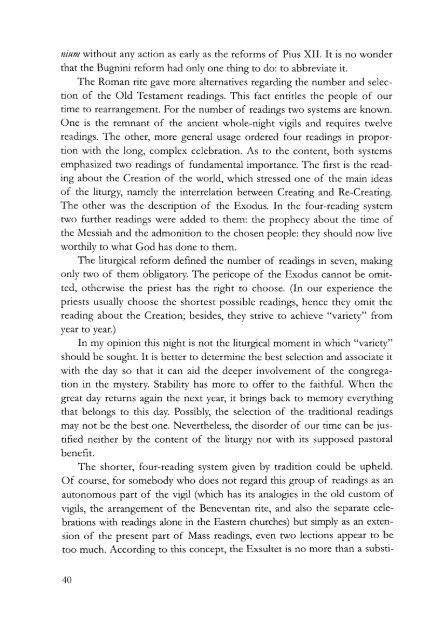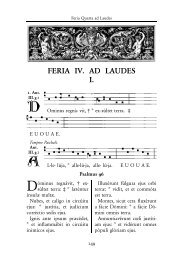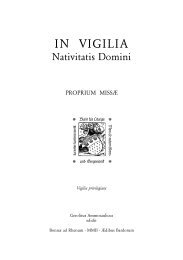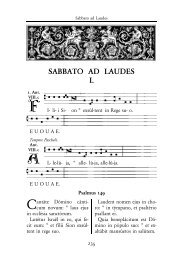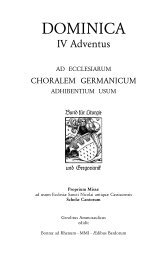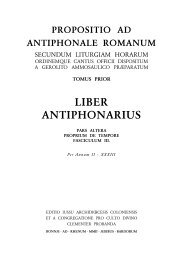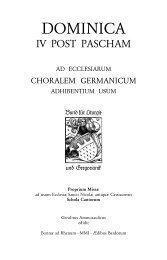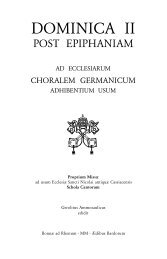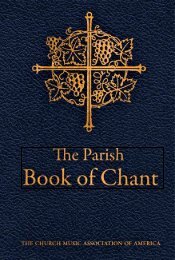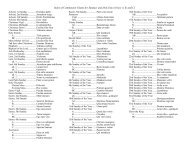The Bugnini-Liturgy and the Reform of the Reform - MusicaSacra
The Bugnini-Liturgy and the Reform of the Reform - MusicaSacra
The Bugnini-Liturgy and the Reform of the Reform - MusicaSacra
Create successful ePaper yourself
Turn your PDF publications into a flip-book with our unique Google optimized e-Paper software.
nium without any action as early as <strong>the</strong> reforms <strong>of</strong> Pius XII. It is no wonder<br />
that <strong>the</strong> <strong>Bugnini</strong> reform had only one thing to do: to abbreviate it.<br />
<strong>The</strong> Roman rite gave more alternatives regarding <strong>the</strong> number <strong>and</strong> selection<br />
<strong>of</strong> <strong>the</strong> Old Testament readings. This fact entitles <strong>the</strong> people <strong>of</strong> our<br />
time to rearrangement. For <strong>the</strong> number <strong>of</strong> readings two systems are known.<br />
One is <strong>the</strong> remnant <strong>of</strong> <strong>the</strong> ancient whole-night vigils <strong>and</strong> requires twelve<br />
readings. <strong>The</strong> o<strong>the</strong>r, more general usage ordered four readings in proportion<br />
with <strong>the</strong> long, complex celebration. As to <strong>the</strong> content, both systems<br />
emphasized two readings <strong>of</strong> fundamental importance. <strong>The</strong> first is <strong>the</strong> reading<br />
about <strong>the</strong> Creation <strong>of</strong> <strong>the</strong> world, which stressed one <strong>of</strong> <strong>the</strong> main ideas<br />
<strong>of</strong> <strong>the</strong> liturgy, namely <strong>the</strong> interrelation between Creating <strong>and</strong> Re-Creating.<br />
<strong>The</strong> o<strong>the</strong>r was <strong>the</strong> description <strong>of</strong> <strong>the</strong> Exodus. In <strong>the</strong> four-reading system<br />
two fur<strong>the</strong>r readings were added to <strong>the</strong>m: <strong>the</strong> prophecy about <strong>the</strong> time <strong>of</strong><br />
<strong>the</strong> Messiah <strong>and</strong> <strong>the</strong> admonition to <strong>the</strong> chosen people: <strong>the</strong>y should now live<br />
worthily to what God has done to <strong>the</strong>m.<br />
<strong>The</strong> liturgical reform defined <strong>the</strong> number <strong>of</strong> readings in seven, making<br />
only two <strong>of</strong> <strong>the</strong>m obligatory. <strong>The</strong> pericope <strong>of</strong> <strong>the</strong> Exodus cannot be omitted,<br />
o<strong>the</strong>rwise <strong>the</strong> priest has <strong>the</strong> right to choose. (In our experience <strong>the</strong><br />
priests usually choose <strong>the</strong> shortest possible readings, hence <strong>the</strong>y omit <strong>the</strong><br />
reading about <strong>the</strong> Creation; besides, <strong>the</strong>y strive to achieve "variety" from<br />
year to year.)<br />
In my opinion this night is not <strong>the</strong> liturgical moment in which "variety"<br />
should be sought. It is better to determine <strong>the</strong> best selection <strong>and</strong> associate it<br />
with <strong>the</strong> day so that it can aid <strong>the</strong> deeper involvement <strong>of</strong> <strong>the</strong> congregation<br />
in <strong>the</strong> mystery. Stability has more to <strong>of</strong>fer to <strong>the</strong> faithful. When <strong>the</strong><br />
great day returns again <strong>the</strong> next year, it brings back to memory everything<br />
that belongs to this day. Possibly, <strong>the</strong> selection <strong>of</strong> <strong>the</strong> traditional readings<br />
may not be <strong>the</strong> best one. Never<strong>the</strong>less, <strong>the</strong> disorder <strong>of</strong> our time can be justified<br />
nei<strong>the</strong>r by <strong>the</strong> content <strong>of</strong> <strong>the</strong> liturgy nor with its supposed pastoral<br />
benefit.<br />
<strong>The</strong> shorter, four-reading system given by tradition could be upheld.<br />
Of course, for somebody who does not regard this group <strong>of</strong> readings as an<br />
autonomous part <strong>of</strong> <strong>the</strong> vigil (which has its analogies in <strong>the</strong> old custom <strong>of</strong><br />
vigils, <strong>the</strong> arrangement <strong>of</strong> <strong>the</strong> Beneventan rite, <strong>and</strong> also <strong>the</strong> separate celebrations<br />
with readings alone in <strong>the</strong> Eastern churches) but simply as an extension<br />
<strong>of</strong> <strong>the</strong> present part <strong>of</strong> Mass readings, even two lections appear to be<br />
too much. According to this concept, <strong>the</strong> Exsultet is no more than a substi-<br />
40


